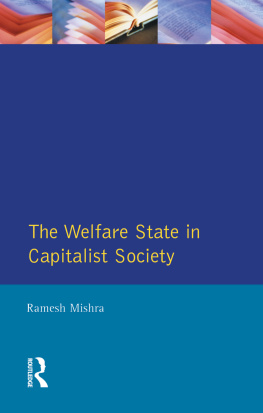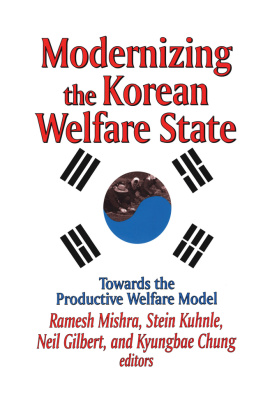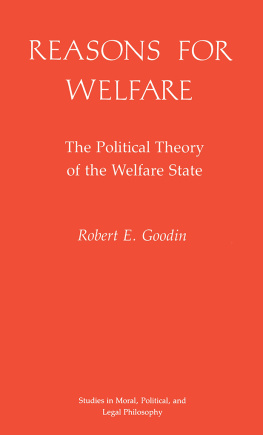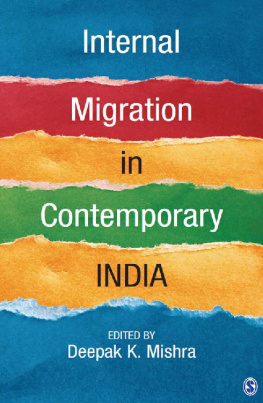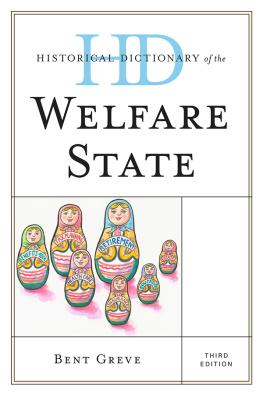The Welfare State in Capitalist Society
Studies in international social policy and welfare
Series Editors: Professor Stewart MacPherson, University of Papua New Guinea
Professor James Midgley, Louisiana State University
Other titles available:
The Crisis in Welfare: An International Perspective on Social Services and Social Work. Brian Munday (editor)
Modern Welfare States: A Comparative View of Trends and Prospects. Robert Friedmann, Neil Gilbert and Moshe Sherer (editors)
Comparative Social Policy and the Third World. Stewart MacPherson and James Midgley
Five Hundred Million Children: Child Welfare in the Third World. Stewart MacPherson
The Welfare State in Capitalist Society
Policies of Retrenchment and Maintenance in Europe, North America and Australia
Ramesh Mishra
York University, Ontario
First published 1990 by Harvester Wheatsheaf
Published 2014 by Routledge
2 Park Square, Milton Park, Abingdon, Oxon OX14 4RN
711 Third Avenue, New York, NY 10017, USA
Routledge is an imprint of the Taylor & Francis Group, an informa business
Ramesh Mishra, 1990
All rights reserved. No part of this book may be reprinted or reproduced or utilised in any form or by any electronic, mechanical, or other means, now known or hereafter invented, including photocopying and recording, or in any information storage or retrieval system, without permission in writing from the publishers.
Notices
Knowledge and best practice in this field are constantly changing. As new research and experience broaden our understanding, changes in research methods, professional practices, or medical treatment may become necessary.
Practitioners and researchers must always rely on their own experience and knowledge in evaluating and using any information, methods, compounds, or experiments described herein. In using such information or methods they should be mindful of their own safety and the safety of others, including parties for whom they have a professional responsibility.
To the fullest extent of the law, neither the Publisher nor the authors, contributors, or editors, assume any liability for any injury and/or damage to persons or property as a matter of products liability, negligence or otherwise, or from any use or operation of any methods, products, instructions, or ideas contained in the material herein.
ISBN 13: 978-0-7450-0211-8 (pbk)
Typeset in 10/12 pt Times
by Keyset Composition, Colchester
British Library Cataloguing in Publication Data
Mishra, Ramesh
The welfare state in capitalist society: policies of retrenchment and maintenance in Europe, North America and Australia. - (Studies in international social policy and welfare; v. 5)
1. Welfare state .
I. Title II. Series
361.65
To the memory of Sumita
Contents
This is the fifth volume in Harvester Wheatsheafs Studies in International Social Policy and Welfare series. Committed to the advocacy of a global perspective in social policy research, the series seeks to publish work which transcends developments in specific countries. By abstracting general trends and issues from local experiences, scholars gain powerful insights into phenomena that cannot be adequately interpreted within the framework of domestic realities. Ramesh Mishra's new book, The Welfare State in Capitalist Society, is a prime example of this genre, and of the advantages of a methodological approach that draws extensively on comparative material. His analysis of the fortunes of the modern welfare state in conditions of economic and ideological adversity is able to generate propositions of significance because it sweeps masterfully over developments on three continents, distilling a multiplicity of discrete domestic events into a coherent, comprehensible account. In this way, Mishra not only fosters a deeper understanding of the forces that impinge on modern welfare systems, shaping their character and future, but also contributes to the growth of social policy as an academic subject. As social policy ventures increasingly into unexplored comparative terrains, its scholarly standing is enhanced. The series is committed to the task of widening the subject's perspective, and Professor Mishra's book serves it well. We are proud to publish the work of this distinguished scholar.
Stewart MacPherson
Professor of Sociology
University of Papua New Guinea
James Midgley
Dean of the School of Social Work
Louisiana State University
Dr Keith Banting and Dr Pat Evans read the book in its draft stage and made detailed comments. My grateful thanks to both. Priscilla Harding managed the task of processing the various drafts of the book with consummate ease and good cheer. She also edited the draft chapters and made substantive comments on the manuscript. Her major contribution in the preparation of this book is gratefully acknowledged. A grant from the Social Sciences and Humanities Research Council of Canada facilitated data collection and enabled me to visit some of the countries discussed in this book. My thanks to colleagues in Canada and abroad who gave generously of their time to discuss this study with me and helped me understand the national contexts of social policy. Finally, thanks are due to my publishers. Harvester Wheatsheaf, for turning a blind eye to my frequent disregard of deadlines. The shortcomings of the book naturally remain my responsibility.
It is more than fifteen years since the first oil-price shock sent inflation soaring and gave rise to a new economic phenomenon in the West - stagflation. It is over ten years since the first neo-conservative government came to power in Britain on the basis of an ideology that repudiated the post-war consensus around a mixed economy and the welfare state. As we enter the 1990s, neo-conservative regimes remain in office in Britain and in the United States. However, contrary to what many people on the left feared and many on the right (and perhaps the far left) hoped, the welfare state has not been dismantled by neo-conservatives. Much of the building stands intact even though cracks are beginning to show, upkeep and maintenance have been minimal and the furnishings are beginning to look shabby. At the other end of the spectrum, Swedish social democracy also remains in power, wedded as much as in the past to the policy of full employment and social welfare. Again, contrary to what many had expected both on the far left and the right, social democracy as a political compromise has not been undermined. This is particularly true of 'corporatist' social democracy as practised in countries like Sweden and Austria. What is more, public support for mainstream universal services remains strong in all Western countries. Much of this suggests continuity and stability and lends credence to the idea that the welfare state has become an irreversible development. What, then, are we to make of the 'crisis' that seemed to have hit the Keynesian welfare state in the mid-1970s? Has the storm blown over and are we once again sailing in calm waters? Is it business as usual, with only a little less cash to go around, and rather more modest expectations for the future as far as social welfare is concerned? And if not, then what has changed? What is the state of the welfare state as we enter the 1990s?
This book is an attempt to answer these admittedly rather large questions. Put simply, the recent history of the welfare state is seen here in terms of three phases: pre-crisis (before 1973), crisis (the mid- to late 1970s), and post-crisis (the 1980s and beyond). The pre-crisis phase was represented by a relatively stable KeynesBeveridge paradigm. The crisis phase saw a sharp decline in the credibility of the Keynesian welfare state as a paradigm and the emergence of neo-conservatism. The post-crisis phase began with the election of neo-conservative governments pledged to break with the objectives and methods of the Keynesian welfare state. The post-crisis phase therefore appears to be one in which the ideological spectrum in social welfare policy has widened, albeit mainly in a rightward direction. Neo-conservatism and social-democratic corporatism appear to be two fairly distinct responses to the predicament of welfare capitalism in the 1970s, the former seeking to retrench the welfare state, the latter seeking to defend it. But do these two responses differ chiefly in their political ideology and rhetoric or are substantial differences in policy and outcome also involved? This book argues that the latter is the case and that these two types of regime represent different clusters of values and interests associated with major class groupings in capitalist society capital and labour. In short, substantial questions of policies, values and social consequences are involved. In practical terms these two types of regime represent the ideological limits within which the contemporary drama of social welfare is being played out. This follows on the argument outlined in my book, The Welfare State in Crisis , which saw the rise of neo-conservatism as the response from the right and the corporatist 'integrated' approach of socialdemocratic welfare states as the most effective response on the left. The present work, which examines these two social policy models in action in some detail, can thus be seen as a sequel to The Welfare State in Crisis.


